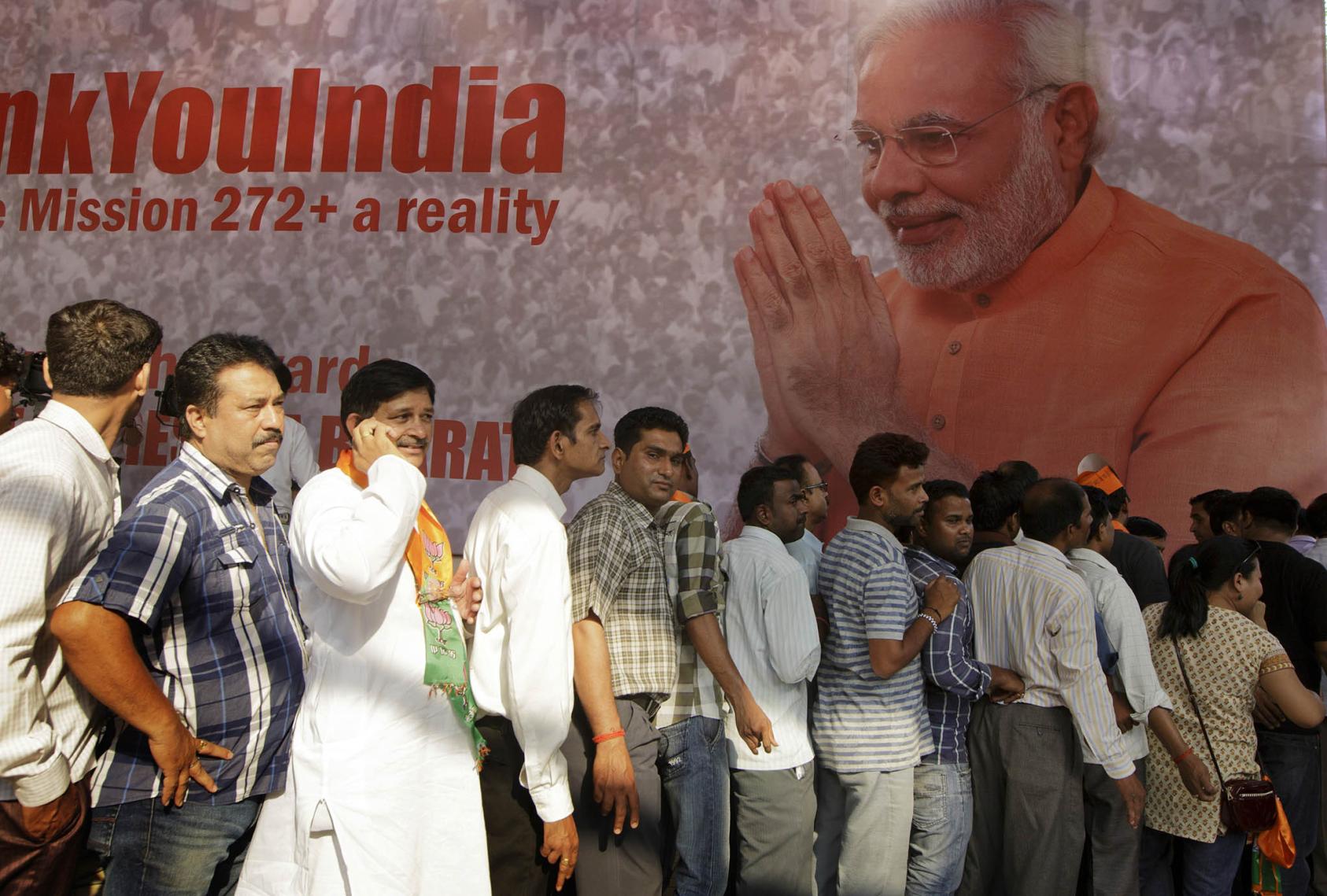
As India embarks on a seven-week general election, the political landscape is becoming increasingly polarized, reflecting deepening societal divides. The ruling Bharatiya Janata Party (BJP), led by Prime Minister Narendra Modi, has intensified its campaign rhetoric, drawing sharp criticism for fostering divisions between Hindus and Muslims. This strategy is raising concerns about the long-term impact on India’s secular democracy.
Recently, the BJP has released a series of controversial campaign materials that depict Muslims as aggressors and invaders. In one particularly provocative video, Muslims are shown attacking Hindu temples and stealing jewelry from Hindu women. This narrative aligns with Modi’s recurrent characterization of Muslims as “infiltrators” in India, a term that evokes strong sentiments and exacerbates communal tensions. Another video depicts an opposition politician placing an egg labeled “Muslims” in a nest with other eggs representing disadvantaged Indian communities. A bird wearing a skull cap, commonly associated with Muslim men, hatches from the egg and violently ejects the other birds from the nest, symbolizing a perceived threat to Hindu interests and national integrity.
The election, which will culminate on May 13, 2024, in its fourth phase, has seen an escalation in hostile rhetoric. Prime Minister Modi, seeking an unprecedented third term, faces stiff competition from a coalition of over two dozen opposition parties led by the Indian National Congress (INC). On Monday, polling will take place for 96 seats across 10 states and territories, including Telangana, Andhra Pradesh, and Odisha, regions where the BJP’s influence is relatively weak.
Political analysts suggest that lower voter turnout in the initial phases of the election has prompted Modi to pivot his campaign strategy. Initially focusing on his economic achievements, Modi has shifted to communal issues, accusing the Congress of intending to extend welfare benefits to Muslims at the expense of disadvantaged Hindu and tribal groups. The Congress has vehemently denied these allegations, countering that Modi’s shift in focus reflects his discomfort with the turnout, a claim the BJP has dismissed.
India, home to 1.4 billion people, is predominantly Hindu but also hosts a significant Muslim minority of about 200 million. Despite the BJP’s emphasis on religious divisions, surveys indicate that voters are primarily concerned with economic issues such as unemployment and inflation. The BJP’s focus on communal polarization appears to be a strategic attempt to divert attention from these pressing economic concerns.
Rahul Gandhi, the prominent leader of the Congress party, has centered his campaign on advocating for better representation and welfare programs for India’s poor and disadvantaged communities. He has consistently criticized the Modi administration for exacerbating wealth inequality during its ten-year tenure, an accusation the government has denied. Gandhi’s platform emphasizes economic issues and social justice, contrasting sharply with Modi’s polarizing approach.
Congress candidate Sunny Hazari has issued strong warnings about the potential consequences of a BJP victory. He argues that Modi’s alliance with the Rashtriya Swayamsevak Sangh (RSS), a right-wing Hindu nationalist organization, could lead to constitutional changes that undermine democratic principles and end affirmative action policies designed to uplift historically disadvantaged groups. Hazari contends that Modi’s focus on Hindu-Muslim tensions distracts from critical issues such as unemployment and inflation, accusing the BJP of provoking communal unrest instead of addressing the country’s economic challenges.
The implications of such a divisive campaign are far-reaching. India’s rich tapestry of cultures, languages, and religions has always been a source of strength, fostering a unique form of democratic pluralism. However, the increasing polarization threatens to unravel this social fabric, leading to a more fragmented and contentious society. The portrayal of Muslims as the ‘other’ not only marginalizes a significant portion of the population but also sows seeds of mistrust and animosity that could have long-term repercussions.
Furthermore, this strategy of communal polarization diverts attention from the pressing economic issues that the country faces. Unemployment rates are high, and many Indians are grappling with rising prices of essential goods. By focusing on religious divisions, the BJP risks neglecting the economic challenges that require urgent attention and comprehensive policy solutions.
As India approaches the crucial voting phase, it is imperative for the electorate to critically evaluate the narratives being presented. The choice between communal division and inclusive development is stark. The future of India’s democracy depends on voters’ ability to see through the rhetoric and focus on issues that truly matter – economic stability, social equality, and the preservation of democratic values.
The BJP’s current campaign strategy, characterized by its divisive rhetoric, represents a significant departure from the principles of unity and inclusivity that have long underpinned Indian democracy. As Prime Minister Modi seeks a third term, the electorate faces a crucial decision that will shape the future of the nation. It is essential for voters to reject divisive narratives and demand leadership that prioritizes economic development, social justice, and the preservation of democratic norms. Only by doing so can India continue to progress as a vibrant, pluralistic democracy.
In conclusion, the BJP’s campaign rhetoric represents a significant challenge to India’s unity and democratic ethos. As voters decide the country’s future leadership, the focus should be on addressing economic and social issues rather than succumbing to divisive narratives. This election is a pivotal moment for India to reaffirm its commitment to inclusive growth and democratic values. The path forward must be one of unity and progress, ensuring that all citizens, regardless of religion or social status, can thrive in a stable and prosperous India.
